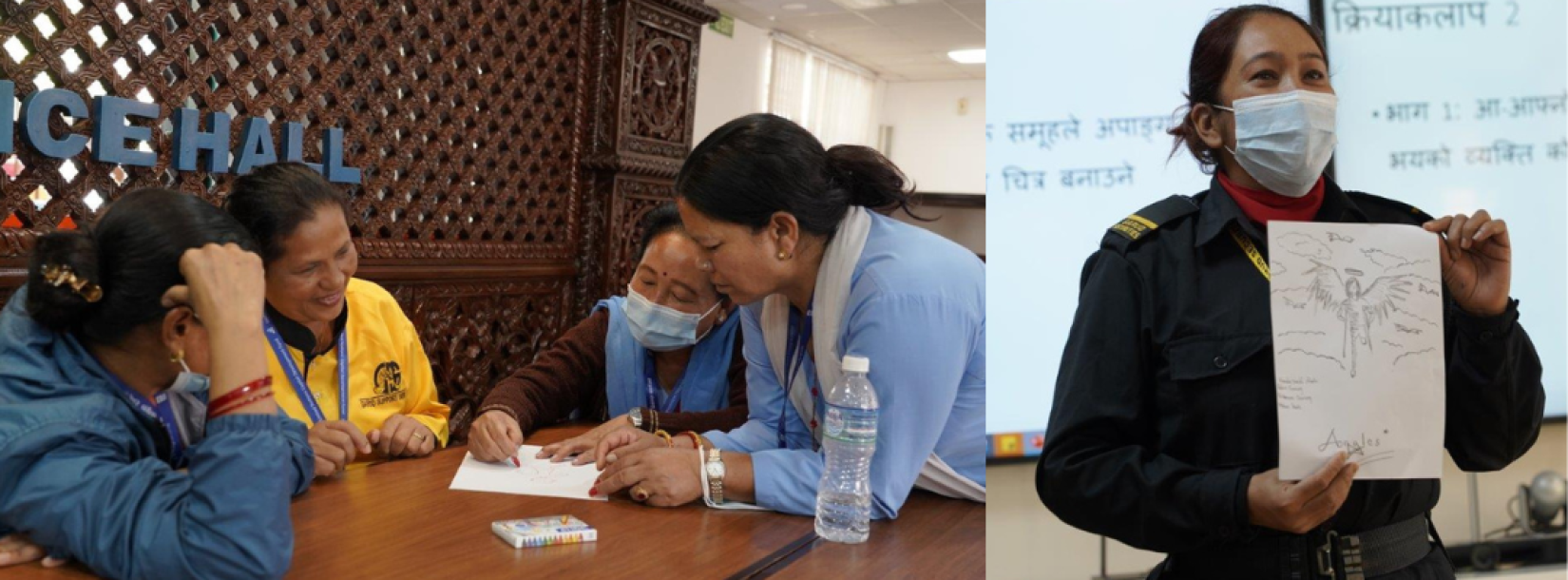Story on Nepal DI work - Accessibility
Accessibility for Inclusion, was the motto for the UN Family in Nepal as it embarked on UNDIS implementation.
Taking note of the Secretary General’s call for making the UN ‘fully accessible for one and for all’, we took to the task with enthusiasm, commitment, and creativity.
Recognizing that progress could only be made if done together, a broad range of initiatives were taken in 2020-2023 that have supported a shifting culture in UN Nepal.
The first accessibility audit of the UN Common Premises was done already in 2019 and has been followed with additional assessments in 2020 and 2022. All of these have been carried out together with the Nepal Federation of Persons with Disabilities (NFDN). The implementation of recommendations have been ongoing since then, and this has inspired similar audits and improvements in offices of UN entities housed outside of the common premises.
It has been a process of learning by doing, mistakes were made and corrected, and working together with OPDs and personnel with disabilities, we found creative solutions when the market did not have everything available.
“Working on the DI project has been really exciting and challenging and has given me immense pleasure as we are doing something in UN House that isn’t yet so common in Nepal. We are really paving the way. I’m proud to be a part of this team that is creating an inclusive environment for all.” Sushma Murray, Facility Management Associate at UN House.
“What the UN is doing in its office is really excellent and a positive example for others. However, it’s really important to remember that accessibility is an ongoing process and we always need to be open to receiving feedback from users and make adjustments along the way.” Sugam Pokhrel, National Federation of the Disabled Nepal (NFDN)
We recognized early on that accessibility is beyond the physical environment and a question of all those working in the UN creating a culture of removing barriers and increasing accessibility. When a flowerpot keeps being placed at the top of a ramp, personnel leave meeting rooms with chairs scattered across the room, or personnel with disabilities are not allowed to enter the premises with their scooters because personal parking is not allowed, accessibility features mean very little. With this in mind, a focus for 2022 was on training and capacity development. The cleaning staff of UN offices in Nepal, our didis and dais, are at the heart of creating safe, accessible and welcoming environments. Similarly, the guards are often the face of the UN for all guests and new personnel entering the UN office.
More than 170 cleaners and guards participated in one-day sessions on disability inclusion, tailored specifically to their role in improving accessibility and inclusion. This training included both the conceptual (what is disability) and the practical (identifying barriers in UN House, by for example measuring how long it takes for floors to dry). It was well received and highly appreciated. The results of the training can already be seen, for example in guests with disabilities entering the UN house being provided necessary guidance and assistance in a way that respects disability inclusion etiquette. Importantly, the trainer also reported that participants shared personal stories of having close family members with disabilities, something they had previously not felt comfortable sharing with their colleagues. This demonstrates that sessions such as these can play a part in addressing some of the stigma around disability and create a more inclusive and caring workplace.

“We have a range of visitors who come to our office everyday including persons with disabilities. Earlier, I wasn’t very aware about disability etiquette and the right ways to interact. But with the training now, we have learnt how to make sure we always interact with respect” Sakuntala Kapali, Cleaner at the UN House
“Through the training we learned so much about ways to offer our support and ensure access, to make sure persons with disabilities feel included while visiting the office.” Karna Bahadur Basnet, Guard at the UN House
Since then, with the lead of the UN Cares team, many of our cleaners, guards and other UN colleagues are now taking a sign language class offered at UN house. Just recently one of the participants facilitated the communication between the deaf teacher and a visually impaired colleague using the signs they had learned so far.
We live in a digital world and for many their interaction within and with the UN happens through our digital platforms. That is why for us since the start of UNDIS implementation, we have placed a heavy focus on assessing digital accessibility, starting with our UN websites and UNCT/RC social media platforms. You can read more about how improving our accessibility made a difference for the user experience for young visually impaired friend and colleague here.
Building on earlier work, we have developed an SOP that includes a set of checklists on accessibility for the use of the UN family in Nepal. This will form a basis for developing a set of minimum standards for UN Nepal website content as well as social media posts across UN Nepal. A commitment from two years ago to say no to manels (all male panels) and increase diversity in our events and communications, was revisited this year to mainstream disability inclusion. The Diversity in Dialogue Pledge includes a promise for diverse representation of persons with disabilities in our communications, the organisation of accessible events (online and in-person), and creating more accessible communication materials, all supporting our promise to leave no one behind.
We build on the incredible work of agencies on disability inclusion over the years, and now look increasingly inwards to ask ourselves, how do we make sure that the UN ‘fully accessible for one and for all’.
Written By:
Aino Efraimsson

